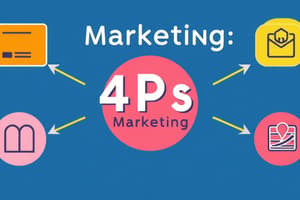Podcast
Questions and Answers
What element of the 4 Ps of Marketing refers to what is being sold?
What element of the 4 Ps of Marketing refers to what is being sold?
- Place
- Price
- Promotion
- Product (correct)
What is the purpose of market research?
What is the purpose of market research?
- To understand consumer preferences and market conditions (correct)
- To set product pricing strategies
- To distribute the product effectively
- To create a unique brand identity
Which of the following is NOT a component of the promotional strategy in marketing?
Which of the following is NOT a component of the promotional strategy in marketing?
- Advertising
- Product placement
- Market segmentation (correct)
- Sales promotion
What defines a target market?
What defines a target market?
Which digital marketing strategy focuses on creating valuable information to attract customers?
Which digital marketing strategy focuses on creating valuable information to attract customers?
What is the primary factor influencing consumer behavior?
What is the primary factor influencing consumer behavior?
Which of the following metrics is commonly used to measure marketing effectiveness?
Which of the following metrics is commonly used to measure marketing effectiveness?
What does A/B testing in marketing involve?
What does A/B testing in marketing involve?
Flashcards are hidden until you start studying
Study Notes
Definition of Marketing
- Marketing: The process of promoting, selling, and distributing a product or service.
- Focuses on understanding customer needs and creating value.
Core Concepts
-
4 Ps of Marketing:
- Product: What is being sold, including features and benefits.
- Price: How much the product costs and pricing strategies.
- Place: Distribution channels used to deliver the product.
- Promotion: Marketing communication strategies to inform and persuade customers.
-
Market Research:
- Gathering data about consumers and market conditions.
- Types: Qualitative (focus groups, interviews) & Quantitative (surveys, statistics).
-
Target Market:
- Specific group of consumers identified as the intended recipient of a marketing message.
- Segmentation can be based on demographics, psychographics, behavior, etc.
-
Branding:
- Creating a unique image and identity for a product in the consumer's mind.
- Involves the use of names, symbols, and design.
-
Digital Marketing:
- Use of digital channels (social media, email, websites) to promote products.
- Key areas include SEO, content marketing, and pay-per-click advertising.
Marketing Strategies
- Content Marketing: Creating valuable content to attract and retain customers.
- Influencer Marketing: Collaborating with influencers to reach broader audiences.
- Social Media Marketing: Engaging with customers via social platforms.
- Email Marketing: Sending targeted messages to prospects and customers.
Consumer Behavior
- Understanding how individuals make purchasing decisions.
- Factors influencing behavior include cultural, social, personal, and psychological aspects.
Metrics and Analysis
- Key Performance Indicators (KPIs): Used to measure marketing effectiveness (e.g., ROI, conversion rates).
- A/B Testing: Comparing two variations to determine which performs better.
Trends in Marketing
- Increased focus on personalization and customer experience.
- Emphasis on sustainability and corporate social responsibility.
- Growth of data-driven marketing and analytics tools.
Definition of Marketing
- Marketing involves promoting, selling, and distributing products or services with a focus on creating value and understanding customer needs.
Core Concepts
- 4 Ps of Marketing:
- Product encompasses the features and benefits of what's being sold.
- Price refers to the cost of the product and the strategies for setting prices.
- Place involves the distribution channels that deliver the product to consumers.
- Promotion consists of communication strategies aimed at informing and persuading customers.
- Market Research:
- Involves collecting data about consumers and market conditions, implemented through qualitative methods (focus groups, interviews) and quantitative methods (surveys, statistics).
- Target Market:
- A specific group of consumers identified for targeted marketing efforts, with segmentation based on demographics, psychographics, and behavior.
- Branding:
- The process of establishing a unique identity for a product in the consumer's mind through names, symbols, and design elements.
- Digital Marketing:
- Promotes products using digital platforms such as social media, email, and websites, focusing on SEO, content marketing, and pay-per-click advertising.
Marketing Strategies
- Content Marketing: Engages customers by creating valuable content that attracts and retains their interest.
- Influencer Marketing: Leverages relationships with influencers to expand reach to new audiences.
- Social Media Marketing: Involves direct engagement with customers on social media platforms.
- Email Marketing: Targets prospects and customers with tailored messages delivered via email.
Consumer Behavior
- Examines the decision-making process individuals go through when making purchases, influenced by cultural, social, personal, and psychological factors.
Metrics and Analysis
- Key Performance Indicators (KPIs): Metrics for assessing marketing effectiveness, including ROI and conversion rates.
- A/B Testing: A method of comparing two variations of a marketing element to determine which one performs better.
Trends in Marketing
- Growing emphasis on personalized marketing and enhancing customer experience.
- Increasing attention to sustainability and corporate social responsibility.
- Rising popularity of data-driven marketing strategies and advanced analytics tools.
Studying That Suits You
Use AI to generate personalized quizzes and flashcards to suit your learning preferences.




